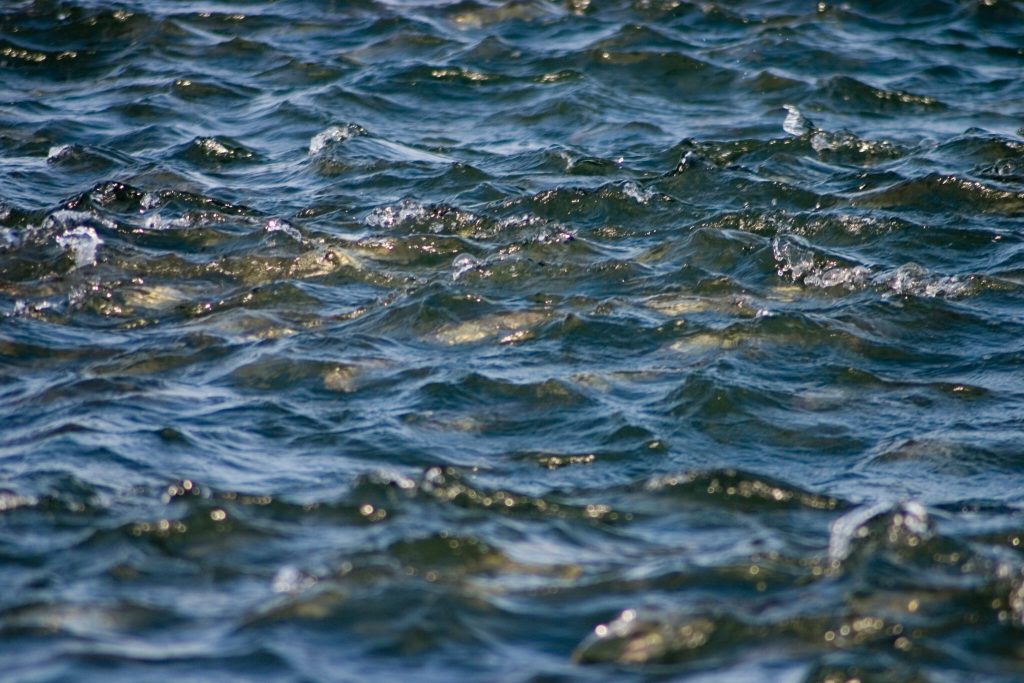ASMFC Approves Amendment 3
ASMFC Approves Amendment 3 to the Interstate Fishery
Management Plan for Atlantic Menhaden
Atlantic Menhaden Board Sets TAC at 216,000 MT for 2018 and 2019
Here is the link to the official press release from the ASMFC:
http://www.asmfc.org/uploads/file//5a0c69b4pr57MenhadenAmendment3_Approval.pdf
Many of us expected this but had wished for an interim conservation measure to have been adopted instead of continuing to harvest menhaden as a single species.
There was amazing support for ecological based reference points. In fact, 160,000 public comments were submitted! Thank you to all Stripers Forever members who spoke up. Because of this public pressure ASMFC has come much closer to committing to accept their own eco based management study that is “due out” in time for the Commission to reconsider in two years. However, according to one of their own scientists the completion of this study is only a “cautiously optimistic” probability….. red herring alert!
This seems to be a warning that the decision of whether or not to implement ecosystem based management as opposed to continuing single species management is still a very long way down the road, if ever. Everyone knows that there can never be enough science to make any marine management report or decision bullet proof. Therefore, I see the ASMFC still tap dancing on quicksand , using delaying tactics in order to prolong and retain the status quo of single species management and continuing to do so for as long as possible.
To redesign all marine fisheries management modalities from single species management to eco based management parameters will open a huge can of worms which partially explains their choice to wait for more information. However, we also know that the enemy of good is perfect. If their argument in defense of retaining single species management is that they do not have sufficient scientific data to make changes then the obvious counter claim should be that there is also insufficient data to support single species management as well. In fact, with few exceptions, the data clearly proves that this approach continues to be harmful and damaging to what is an on-going degradation of marine species.
In spite of or maybe because of the actions of the ASMFC maybe there is room for optimism. The fact that 160,000 folks made an effort to change to status quo in favor of a more conservative approach to management decisions lends hope to their being a public awakening and acceptance of responsibility. Folks generally get what they deserve. Rewards are proportionally relative to the amount of invested effort made.
This recent exercise may well prove to be the impetus or rallying cry for greater public input and influence over the management of property that belongs to all of us equally. The common ground that 160,000 folks shared was support for the conservation of our marine environment. That in and of itself is good news.
-Dean Clark (MA Co-Chair, National Board Member)
Action Request- Atlantic Menhaden Draft Amendment 3

© 2017 David Shupp
The Most Important Fish In The Sea Needs Your Help!
Menhaden one of the ocean’s most valuable forage fish, are a primary food source for wild striped bass and without them there will be dire consequences for their entire ecosystem. Because of past over-harvesting, species like striped bass that normally feed on menhaden have displayed symptoms of malnourishment and disease.
Menhaden have regularly been overfished during the past 55 years according to the Atlantic States Marine Fisheries Commission, the regulatory agency in charge of managing them. Menhaden are being regulated as a single species with little regard for their interdependent value within their ecosystem. That is about to change…..with your help. NOAA is pushing for current single species management models to transition over to ecosystem- based management (EBM) protocols.
The goal of EBM is to recognize species interdependency and maintain ecosystems in a healthy, productive and resilient condition. As a regulatory commission the ASMFC is asking for your input on how best to implement this effort. With the help of professional volunteers that have many years of fisheries oversight, we have made it simple and easy for you to participate. Below we have outlined the considered options that we feel will be best for Menhaden, wild Striped Bass and their entire shared ecosystem.
Your comments will have more impact if you do not mention being a member of any specific organization. Please use your own words when expressing your option choices.
Public comment will be accepted until 5:00 PM (EST) on October 20, 2017 and should be forwarded to Megan Ware, FMP Coordinator, 1050 N. Highland St, Suite A‐N, Arlington, VA 22201; 703.842.0741 (FAX)
- 2.6.4 Definition of Overfishing and Overfished/Depleted
- Option C: BERP Workgroup Continues to Develop Menhaden-Specific ERPs with Interim use of Pikitch et al. Reference Points
- 4.3.2 Quota Allocation
- Option F: Allocation based on TAC levels
- Sub-option 1
- 4.3.4 Quota Rollovers
- Option A: Unused Quota May Not Be Rolled Over
- 4.3.5 Incidental Catch and Small Scale Fisheries
- Option F: All Catch Included in TAC
- 4.3.6 Episodic Events Set Aside Program
- Option C: 0% of TAC is Set Aside
- 4.3.7 Chesapeake Bay Reduction Fishery Cap
- Option B; Cap Set At 51,000 mt
- Sub-Option B: No Rollover of Unused Cap Permitted.
States Schedule Hearings on Atlantic Menhaden Draft Amendment 3
Arlington, VA – The Atlantic coastal states of Maine through Florida have scheduled their hearings to gather public comment on Draft Amendment 3 to the Interstate Fishery Management Plan for Atlantic Menhaden. The details of those hearings follow.
Maine Dept. of Marine Resources
October 5, 2017; 6 PM
Yarmouth Town Hall
200 Main Street
Yarmouth, ME
Contact: Pat Keliher at 207.624.6553
New Hampshire Fish and Game Department
October 3, 2017; 7 PM
Urban Forestry Center
45 Elwyn Road
Portsmouth, NH
Contact: Cheri Patterson at 603.868.1095
Massachusetts Division of Marine Fisheries
October 2, 2017; 6 PM
Thayer Public Library, Logan Auditorium
798 Washington Street
Braintree, MA
Contact: Nichola Meserve at 617.626.1531
October 5, 2017; 6 PM
Bourne Community Center, Room 2
239 Main Street
Buzzards Bay, MA
Contact: Nichola Meserve at 617.626.1531
Rhode Island Division of Fish and Wildlife
October 4, 2017; 6 PM
University of Rhode Island Bay Campus
Corless Auditorium, South Ferry Road
Narragansett, RI
Contact: Robert Ballou at 401.222.4700 ext: 4420
Connecticut Department of Energy and Environmental Protection
September 11, 2017; 7 PM
CT DEEP Boating Education Center
333 Ferry Road
Old Lyme, CT
Contact: Mark Alexander at 860.447.4322
New York Dept. of Environmental Conservation
September 12, 2017; 6 PM
NYSDEC Division of Marine Resources
205 N. Belle Mead Road
East Setauket, NY
Contact: Jim Gilmore at 631.444.0430
New Jersey Division of Fish and Wildlife
September 13, 2017; 6 PM
Manahawkin (Stafford Township) Courtroom
260 East Bay Avenue
Manahawkin, NJ
Contact: Russ Allen at 609.748.2020
Delaware Division of Fish and Wildlife
September 14, 2017; 6 PM
DNREC Auditorium
89 Kings Highway
Dover, DE
Contact: John Clark at 302.739.9914
Maryland Dept. of Natural Resources
September 18, 2017; 6 PM
Anne Arundel Community College
Cade Center for the Fine Arts – Room 219
101 College Parkway
Arnold, MD
Contact: Lynn Fegley at 410.260.8285
Potomac River Fisheries Commission
September 19, 2017; 6 PM
Carpenter Building
222 Taylor Street
Colonial Beach, VA
Contact: Martin Gary at 804.456.6935
Virginia Marine Resources Commission
September 20, 2017; 6 PM
Northumberland High School
201 Academic Lane
Heathsville, VA
Contact: Rob O’Reilly at 757.247.2247
September 21, 2017; 6 PM
2600 Washington Avenue, 4th Floor
Newport News, VA
Contact: Rob O’Reilly at 757.247.2247
North Carolina Division of Marine Fisheries
September 27, 2017; 6 PM
Central District Office
5285 US Highway 70 West
Morehead City, NC
Contact: Michelle Duval at 252.808.8013
Florida Fish and Wildlife Conservation Commission
September 26, 2017; 6 PM
Town of Melbourne Beach Community Center
507 Ocean Avenue
Melbourne Beach, FL
Contact: Jim Estes at 850.617.9622
SUMMARY
Draft Amendment 3 seeks to manage the menhaden resource in a way that balances menhaden’s ecological role as a prey species with the needs of all user groups. To this end, the Draft Amendment considers the use of ecosystem reference points (ERPs) to manage the resource and changes to the allocation method. In addition, it presents a suite of management options for quota transfers, quota rollovers, incidental catch, the episodic events set aside program, and the Chesapeake Bay reduction fishery cap.
The 2015 Benchmark Stock Assessment Report identified the development of ERPs as a high priority for Atlantic menhaden management. Menhaden serve an important role in the marine ecosystem as prey for a variety of species including larger fish (e.g. weakfish, striped bass), birds (e.g. bald eagles, osprey), and marine mammals (e.g. humpback whales, bottlenose dolphins). As a result, changes in the abundance of menhaden may impact the abundance and diversity of predator populations, particularly if the availability of other prey is limited. ERPs provide a method to assess the status of menhaden within the broad ecosystem context. Draft Amendment 3 provides a variety of reference point options, including the continued development of menhaden-specific ERPs as well as the application of precautionary guidelines for forage fish species.
Draft Amendment 3 also considers changes to the allocation method given concerns that the current approach may not strike an appropriate balance between gear types and jurisdictions. Specifically, under the current allocation method, increases in the total allowable catch (TAC) result in limited benefits to small-scale fisheries, and to several states. Furthermore, the current method may not provide a balance between the present needs of the fishery and future growth opportunities. Draft Amendment 3 considers a range of allocation alternatives, including a dispositional quota (bait vs. reduction), fleet-capacity quota (quota divided by gear type), jurisdictional quota, including a fixed minimum quota for each state, and an allocation method based on the TAC. In addition, the document considers five allocation timeframes including 2009-2011, 2012-2016, 1985-2016, 1985-1995, and a weighted approached which considers both historic and recent landings.
The Draft Amendment is available at http://www.asmfc.org/files/PublicInput/AtlanticMenhadenDraftAmendment3_PublicComment.pdf or on the Commission website, www.asmfc.org, under Public Input. Fishermen and other interested groups are encouraged to provide input on the Draft Amendment either by attending state public hearings or providing written comment. Public comment will be accepted until 5:00 PM (EST) on October 20, 2017 and should be forwarded to Megan Ware, FMP Coordinator, 1050 N. Highland St, Suite A-N, Arlington, VA 22201; 703.842.0741 (FAX) or at comments@asmfc.org(Subject line: Draft Amd. 3). If your organization is planning to release an action alert in response to Draft Amendment 3, please contact Megan Ware at 703.842.0740, so she can work with you to develop a unique subject line to enable us to better organize and summarize incoming comments for Board review.
Final action on the Amendment, as well as specification of the 2018 TAC, is scheduled to occur on November 13 & 14 at the BWI Airport Marriott, 1743 West Nursery Road, Linthicum, MD. For more information, please contact Megan Ware, Fishery Management Plan Coordinator, at mware@asmfc.org or 703.842.0740.
Immediate Action Request- EEZ Legislation Proposed
Last Year Representative Lee Zeldin of NY tried to pass federal legislation that took waters off Montauk Point NY out of the EEZ managed by NOAA and gave control instead to the State of NY. He wanted to do this because commercial fishermen are not allowed to take striped bass from federal waters. Luckily better thinking prevailed and his attempts were defeated.
Stripers Forever has always opposed efforts to open the EEZ to the keeping of striped bass because we feel that the EEZ closure which has stood since the mid-1980s provides a sanctuary for the large breeders. This is especially important right now because the large stripers are relatively depleted, and these fish are the most important breeders and finest genetic specimens.
Rep. Zeldin is at it again! He has introduced two amendments to appropriations bills that would prohibit NMFS and the U.S. Coast Guard from using any of their budget to enforce striped bass regulations in the EEZ.
You can find the language of the bills here:
- http://amendments-rules.house.gov/amendments/ZELDIN_028_xml825170923412341.pdf
- http://amendments-rules.house.gov/amendments/ZELDIN_029_xml825170924102410.pdf
We are suggesting that our members within the districts of these legislators individually join Stripers Forever in sending an e-mail that opposes these amendments to the following legislators:
- Rep. Zeldin (Eastern LI, NY)
- Rep. Jose Serrano (Harlem & Bronx, NY)
- Rep. Nita Lowey (Rockland & Westchester Counties in NY)
- Rep. Rodney Frelinghuysen (Morris, Essex, Sussex, Passaic Counties in NJ)
The above links will take you to the online email form for each legislator. You cannot send them an email without using the online email form linked to above. You need to be a constituent of these legislators to e-mail them directly, but anyone so motivated can send them postal mail, which is what Stripers Forever has done.
The hearings on these amendments start as early as Tuesday 9/5, so please do this today.
THE POTENTIAL DEREGULATION OF COOPERATIVE FISHERIES MANAGEMENT

HISTORY:
When the Atlantic States Marine Fisheries Commission (ASMFC) was created, it had limited enforcement authority. This meant that every State had the independent option to ignore or comply with the decisions of the governing body. Due to this regulatory ineffectiveness, in the early 1990’s the States worked cooperatively with Congress and passed the Atlantic Coast Fisheries Cooperative Management Act (Atlantic Coastal Act) requiring all states to obey regulations developed by the ASMFC or be subject to punitive action for that fishery in their state waters.
It has been this threat of punitive Federal action that has kept and made fisheries regulations enforceable. In fact, this forced compliance was primarily responsible for the final rebuilding of striped bass.
NEWS UPDATE:
It has been prophetically said that those who forget history are doomed to repeat it. Because of a recent procedural ruling, it is now possible that we have returned to the old days of vested states interests trumping the collective wishes of the Commission. New Jersey came up with a plan (for Summer flounder management) that they maintained was equivalent to the one developed by the ASMFC. The ASMFC Technical Committee disagreed, and the member states voted to find New Jersey out of compliance and thus subject to penalty.
New Jersey followed procedural rules and appealed this decision to the Secretary of Commerce. Why the Secretary of Commerce? Because that is the process written into the Atlantic Coastal Act. In the new Washington spirit of deregulation, unsurprisingly, the Secretary decided the New Jersey plan was OK thereby undermining the unanimous (minus NJ) vote of the ASMFC.
We are not picking on New Jersey here. They followed the procedural rules. We are simply pointing out that, to our knowledge, this redress action has not been employed before now. No longer is a vote by the ASMFC traditionally the final word in regulating fisheries that fall under their jurisdiction. The regulatory or procedural dynamic has changed.
Some may applaud this decision as a victory for states’ rights. Politics aside, it does put the camel’s nose under the tent of potentially deregulating all cooperative interstate fisheries management. This unilateral ruling by the Secretary establishes an ominous procedural precedent. Without a federal hammer to require the states to accept the decisions of a multi-state commission such as the ASMFC, the regulatory authority of all multi-state compacts is in jeopardy.
Going forward, any member State of the ASMFC that does not like the regulation decisions collectively made by the ASMFC can appeal to the Secretary of Commerce and stand a chance of having their own management plan approved. In other words, potentially we are now back to the dark ages of fisheries management when each state could, with impunity, make its own selfish management decisions even when dealing with migratory species that recognize no state lines of jurisdiction.
As Sergeant Joe Friday would say, “Just the facts please, just the facts.”
- Many of States on the ASMFC allow commercial fishing for wild striped bass.
- The majority of delegates to the ASMFC politically align themselves in support of commercial fishing.
- Each State’s delegation is politically appointed to the ASMFC and assigned to advance that state’s interests.
WHAT THIS MEANS FOR THE FUTURE:
This new deregulated twist to what has been an established, procedural management precedent for nearly 25 years has ominous overtones. We are dangerously flirting with the return of the Wild West, when it comes to undermining coordinated and cooperative fisheries management between States.
Independent states behavior is what nearly ruined the wild striped fishery forever. Hopefully, saner minds will prevail and stripers will not repeat and be forced to undergo the history of state-by-state selfish exploitation. However, as long as they are managed as a commercial product each State will be out to get as much value from the fishery as they possibly can which will most certainly once again lead to over harvesting.
One way to combat the harvesting pressure that is brought to bear by commercial fishery advocates is if we, as concerned anglers and conservationists, can band together and have wild stripers declared a game fish. Accomplishing this will at least insulate them from commercial exploitation.
Dean Clark, Board of Directors- Stripers Forever







